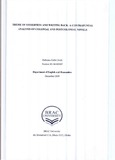Theme of otherness and writing back: a cotrapuntal analysis of colonial and postcolonial novels

View/
Date
2009-12Publisher
BRAC UniversityAuthor
Orchi, Ridwana KabirMetadata
Show full item recordAbstract
The British Empire spanned the Indian subcontinent, Australia, almost half of Africa, parts of North America and the Caribbean Islands during the colonial era and subjugated the people of these lands both physically and psychologically. The colonizers generated a Eurocentric ideology by creating simple but deep-rooted distinctions like self vs. other, master vs. slave, civilized vs. savage, white vs. black, good vs. evil, strong vs. weak, occident vs. orient, elite vs. subaltem and so forth in terms of knowledge, culture and in the daily life of colonized societies. For the British, the process of colonization was a part of discovering exotic and mysterious places which were to be “civilized” by them. So through the use of the “Bible” and the “sword,” they imposed their language and culture on colonized minds. This influence had such a deep impact that many colonial writers have portrayed the Europeans as superior and the ‘self’ belonging to the ‘centre’ or ‘Occident,’ whereas the colonized people (of which they are a part) are shown as inferior and the ‘other’ belonging to the ‘margin’ or ‘Orient’.
The psychological domination that took place during the period of colonization persists even today. However, many postcolonial writers have successfully reshaped and redefined the constructed image of self and other by distorting the stereotypical images of colonized people, their cultures and languages in literature. Thus, they have taken the narratives to another level by giving voice to the other and by presenting their own colonial history and the consequences of colonization to match their own purposes. This thesis intends to look at the discourse of ‘otherness,’ from colonial representations to postcolonial realities of ‘other’ people and languages.
Keywords
English and humanitiesDescription
This thesis is submitted in partial fulfillment of the requirements for the degree of Bachelor of Arts in English, 2009.Type
ThesisCollections
- Thesis, B.A. (English) [578]
